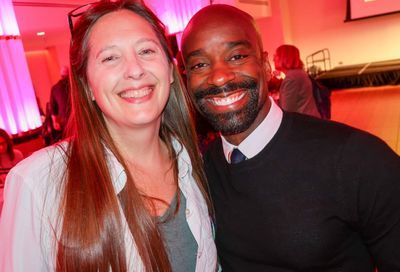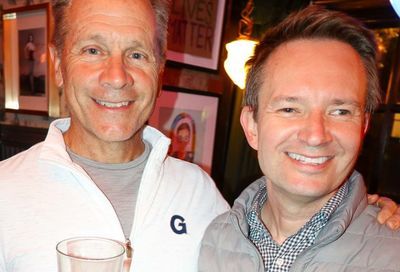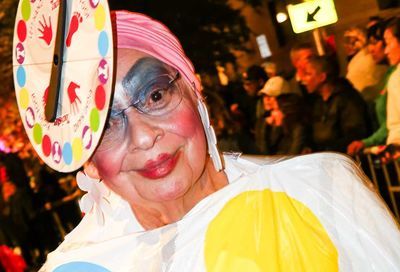Quarter-Century Sentence for Corkins
Gay man who pleaded guilty in Family Research Council shooting gets 25 years on terrorism, AWIK convictions
Floyd Lee Corkins II, the 29-year old Virginia gay man who pleaded guilty in February to committing the August 2012 shooting at the Family Research Council’s (FRC) D.C. headquarters with the intent of carrying out a mass killing, was sentenced Thursday morning by U.S. District Court Judge Richard W. Roberts to 25 years in jail, with five years supervised release after finishing his sentence.
Corkins, of Herndon, Va., originally faced 10 separate charges related to the shooting, but chose to plead guilty to committing an act of terrorism while armed, assault with intent to kill (AWIK), and interstate transportation of a firearm and ammunition. Corkins is the first defendant to be charged and convicted under the District of Columbia’s Anti-Terrorism Act of 2002, which prosecutes actions committed with the intent to ”intimidate or coerce a significant population of the District of Columbia or the United States.”
Prosecutors had originally pushed for a 45-year sentence for Corkins on the three charges, while Corkins’s lawyer, David Bos, had argued for an 11-and-a-half year sentence, as well as assurances that Corkins would continue to receive mental-health treatment during his time and prison and when placed on supervised release. In his Sept. 10 sentencing memorandum, Bos noted that Corkins had no prior criminal record and had been receiving mental health treatment as a result of suffering from ”auditory hallucinations and having thoughts of killing his parents and conservative right-wing Christians.” Bos also noted that Corkins had been diagnosed with severe depression with schizophrenic aspects and had been receiving anti-psychotic medication as part of his treatment, but missed a crucial dose on Aug. 14, the night prior to the shooting.
But prosecutors had sought, months earlier, to preempt Bos’s requests for a lighter sentence, writing in their April 19 sentencing memorandum: ”Although the defendant appears to suffer from bouts of severe depression and unidentified ‘psychosis,’ there is absolutely nothing to indicate that the defendant did not fully comprehend what he was planning and sought to accomplish in the shooting perpetrated at the FRC. Instead, the detailed nature of his planning and execution reveal the deliberate and clear-headed manner in which the defendant acted in this case.”
According to the government’s evidence, Corkins, who briefly served as a volunteer receptionist at The DC Center, the city’s LGBT community center, purchased a semiautomatic pistol that he later converted from a 22-caliber pistol into a 9-millimeter firearm in Virginia on Aug. 9, 2012, and began planning his trip to the FRC’s downtown D.C. headquarters. On the evening of Aug. 14, Corkins returned to the store where he purchased the gun and engaged in shooting practice.
On Aug. 15, Corkins entered the Family Research Council headquarters, posing as a prospective intern. After being allowed into the building, he pulled the pistol from his backpack and pointed it at security guard Leonardo Reno ”Leo” Johnson, who charged Corkins. The two struggled, with Corkins firing off three shots and striking Johnson in the arm. Johnson eventually subdued Corkins and handed him over to law enforcement officers.
Johnson underwent emergency surgery, in which metal plates were inserted into his arm to allow his shattered bones to heal. Numerous bullet fragments remain in his arm, and he was unable to work for several months. For his actions in protecting the FRC staff, Mayor Vincent Gray (D) awarded Johnson with the inaugural Mayor’s Medal of Honor on Oct. 22, 2012.
Once he was subdued, Corkins told Johnson, ”It’s not about you,” but about the FRC’s policies. He was heard making remarks such as, ”I don’t like these people, and I don’t like what they stand for.”
Police later discovered two fully loaded magazine clips, 50 rounds of ammunition, a handwritten list of four socially conservative, anti-gay organizations that included the FRC, and 15 wrapped Chick-fil-A sandwiches on Corkins’s person or in his backpack. Corkins told investigators he was an activist and had planned to ”kill as many people as I could” and smear the Chick-fil-A sandwiches on their faces afterward. Chick-fil-A has received attention for supporting anti-gay organizations through an affiliated foundation. Among other things, Corkins told detectives, ”Chick-fil-A came out against gay marriage so I was going to use that as a statement.”
Corkins also told investigators he had been thinking about perpetrating similar violence for years. He said that had he not been stopped at FRC headquarters, he planned to go to the next organization on his list and carry out a similar shooting there. Corkins also claimed he had gotten the names of the organizations from a list of anti-gay hate groups on the website of the Southern Poverty Law Center.
Following Corkins’s sentencing, Ronald C. Machen Jr., the U.S. attorney for the District of Columbia; Valerie Parlave, assistant director of the FBI’s Washington Field Office; and Metropolitan Police Department Chief Cathy Lanier issued a joint statement praising the sentence.
”A security guard’s heroism is the only thing that prevented Floyd Corkins, II from carrying out a mass shooting intended to kill as many people as possible,” Machen said in the statement. ”Our entire community is thankful to the hero who stood up to this heinous attack. Today’s 25-year prison sentence demonstrates the steep price to be paid for turning to violence to terrorize your political enemies.”
”Acts of terrorism, like the one that Mr. Corkins admitted to committing in pursuit of political aim, are horrific events that instill a sense of fear on our community,” Parlave said. ”The FBI applauds the heroic acts of the security guard who deterred Mr. Corkins from inflicting harm on additional victims. With our law enforcement partners, the FBI will respond to, secure and investigate scenes and bring violent actors to justice.”
In the joint statement, Lanier said, ”I want to commend FRC employee Leonardo Johnson for his heroism and the first responding officers for their quick assessment of the situation, which brought stability and control to the chaos.” Then, referencing the Sept. 16 shootings that killed 13, including the suspected shooter, at the Navy Yard in Southeast Washington, she added, ”As recent events have shown us, quick thinking and bravery during incidents like this can save many lives.”
Support Metro Weekly’s Journalism
These are challenging times for news organizations. And yet it’s crucial we stay active and provide vital resources and information to both our local readers and the world. So won’t you please take a moment and consider supporting Metro Weekly with a membership? For as little as $5 a month, you can help ensure Metro Weekly magazine and MetroWeekly.com remain free, viable resources as we provide the best, most diverse, culturally-resonant LGBTQ coverage in both the D.C. region and around the world. Memberships come with exclusive perks and discounts, your own personal digital delivery of each week’s magazine (and an archive), access to our Member's Lounge when it launches this fall, and exclusive members-only items like Metro Weekly Membership Mugs and Tote Bags! Check out all our membership levels here and please join us today!























